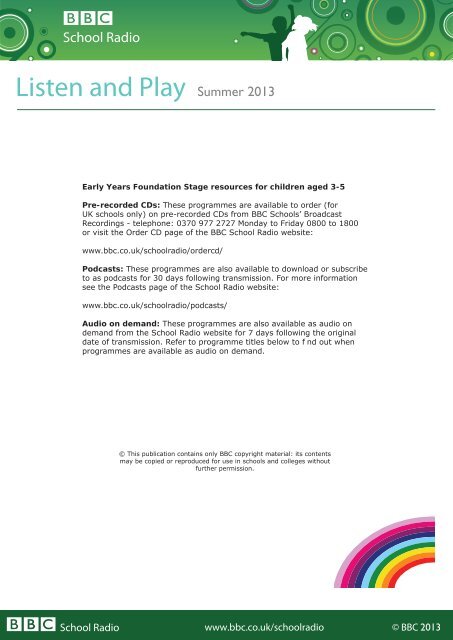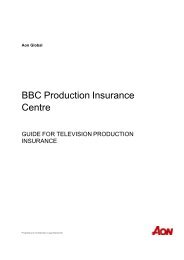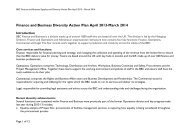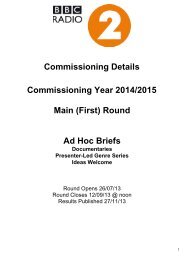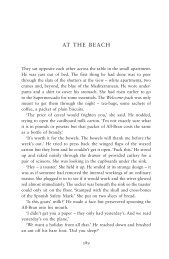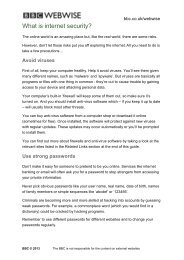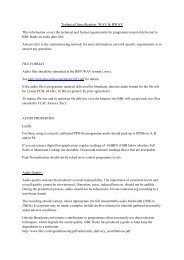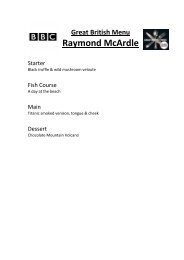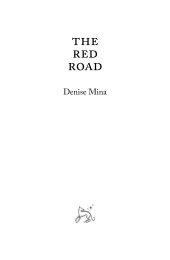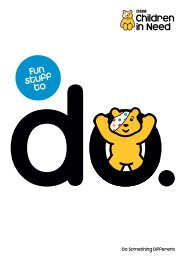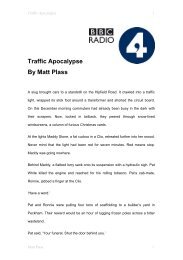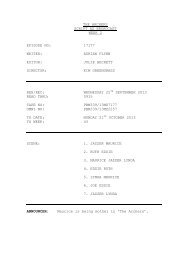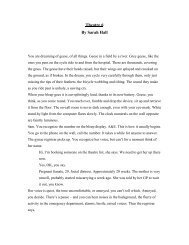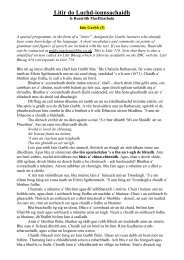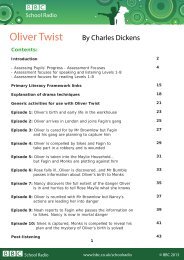You also want an ePaper? Increase the reach of your titles
YUMPU automatically turns print PDFs into web optimized ePapers that Google loves.
School Radio<br />
<strong>Listen</strong> <strong>and</strong> <strong>Play</strong> <strong>Summer</strong> <strong>2013</strong><br />
Early Years Foundation Stage resources for children aged 3-5<br />
Pre-recorded CDs: These programmes are available to order (for<br />
UK schools only) on pre-recorded CDs from <strong>BBC</strong> Schools’ Broadcast<br />
Recordings - telephone: 0370 977 2727 Monday to Friday 0800 to 1800<br />
or visit the Order CD page of the <strong>BBC</strong> School Radio website:<br />
www.bbc.co.uk/schoolradio/ordercd/<br />
Podcasts: These programmes are also available to download or subscribe<br />
to as podcasts for 30 days following transmission. For more information<br />
see the Podcasts page of the School Radio website:<br />
www.bbc.co.uk/schoolradio/podcasts/<br />
Audio on dem<strong>and</strong>: These programmes are also available as audio on<br />
dem<strong>and</strong> from the School Radio website for 7 days following the original<br />
date of transmission. Refer to programme titles below to f nd out when<br />
programmes are available as audio on dem<strong>and</strong>.<br />
© This publication contains only <strong>BBC</strong> copyright material: its contents<br />
may be copied or reproduced for use in schools <strong>and</strong> colleges without<br />
further permission.<br />
School Radio www.bbc.co.uk/schoolradio<br />
© <strong>BBC</strong> <strong>2013</strong>
<strong>BBC</strong> School Radio <strong>Listen</strong> <strong>and</strong> <strong>Play</strong> <strong>Summer</strong> <strong>2013</strong><br />
__________________________________________________________________________________<br />
<strong>Listen</strong> <strong>and</strong> <strong>Play</strong><br />
<strong>Summer</strong> <strong>2013</strong><br />
Introduction 1<br />
1 Rappa Tappa 3<br />
Podcast / AOD begins 30/04/<strong>2013</strong><br />
2 Bangle Jangle 7<br />
Podcast / AOD begins 07/05/<strong>2013</strong><br />
3 Steady Neddy 11<br />
Podcast / AOD begins 14/05/<strong>2013</strong><br />
4 Ishy Fish 14<br />
Podcast / AOD begins 21/05/<strong>2013</strong><br />
5 Jiggy Pig 17<br />
Podcast / AOD begins 04/06/<strong>2013</strong><br />
6 Oggy Dog 20<br />
Podcast / AOD begins 11/06/<strong>2013</strong><br />
7 Funny Bunny 23<br />
Podcast / AOD begins 18/06/<strong>2013</strong><br />
8 Huggy Bug 26<br />
Podcast / AOD begins 25/06/<strong>2013</strong><br />
1<br />
Introduction<br />
How to use the programmes <strong>and</strong> notes:<br />
The <strong>Listen</strong> <strong>and</strong> <strong>Play</strong> programmes are designed<br />
for use in four sections. For younger children,<br />
or those who need help in developing their<br />
attention span, listen to one section at a time,<br />
interspersed with opportunities for movement or<br />
play. As children get better at listening activities,<br />
extend the length of time until they can manage a<br />
complete programme at one sitting.<br />
Children are usually able to listen for longer on a<br />
second or third hearing of the programme. It is<br />
also easier to encourage participation on repeated<br />
hearings, especially if you have practised songs<br />
<strong>and</strong>/or actions in the meantime.<br />
Section 1: Introduction <strong>and</strong> sound<br />
discrimination games<br />
- Title song:<br />
<strong>Listen</strong> all around / <strong>Listen</strong> for the sounds / <strong>Listen</strong>,<br />
<strong>Listen</strong>, <strong>Listen</strong>,<br />
<strong>Listen</strong> all around / <strong>Listen</strong> for the sounds / <strong>Listen</strong>,<br />
<strong>Listen</strong>, <strong>Listen</strong>.<br />
Encourage children to join in with <strong>and</strong> learn<br />
the words of <strong>Listen</strong> all around featured at the<br />
beginning <strong>and</strong> end of the programme. Make up<br />
appropriate actions, so kinaesthetic <strong>and</strong> visual<br />
memory aid the development of auditory memory.<br />
- Hello<br />
Encourage listeners to join in with the children’s<br />
voices. The ‘hellos’ are a good starting point for<br />
modelling how to do this.<br />
- <strong>Listen</strong> all around<br />
The presenter, Liz, invites children to guess where<br />
the programme is set (some settings are easier to<br />
guess than others). They are invited to respond,<br />
but you need to ensure plenty of listening time<br />
f rst of all. When Liz says ‘<strong>Listen</strong>’, make a shhh<br />
action for a count of 3–5 seconds to ensure that<br />
everyone gets to hear before anyone calls out.<br />
- <strong>Listen</strong>ing for individual sounds<br />
Now that children are orientated to the setting,<br />
discriminating individual sounds should be easier.<br />
Liz then provides a ‘voiced’ version of the sound<br />
(e.g. snake: sssssssss). Use these voiced versions<br />
later when talking about the programme.<br />
School Radio www.bbc.co.uk/schoolradio<br />
© <strong>BBC</strong> <strong>2013</strong>
<strong>BBC</strong> School Radio <strong>Listen</strong> <strong>and</strong> <strong>Play</strong> <strong>Summer</strong> <strong>2013</strong><br />
__________________________________________________________________________________<br />
Section 2: Songs <strong>and</strong> rhymes<br />
Some of the songs <strong>and</strong> rhymes are traditional,<br />
others have been specially composed or adapted,<br />
but all employ simple, repetitive, rhythmic,<br />
patterned language. Many of the songs are<br />
simple enough for children to begin to join in on<br />
f rst hearing, <strong>and</strong> the tunes have been specially<br />
designed to be accessible for young voices.<br />
The notes provided for each song/rhyme often<br />
suggest making up actions to accompany<br />
performance. If you know Makaton or another<br />
signing system, use selected signs – if not,<br />
just make up your own or ask children for<br />
suggestions.<br />
The words of songs <strong>and</strong> rhymes are provided<br />
so you can sing/recite them again afterwards.<br />
With plenty of repetition <strong>and</strong> related activity<br />
(e.g. dramatisation, making actions, dancing),<br />
they should be easy to memorize – with all<br />
the advantages this implies for language <strong>and</strong><br />
listening development. The more songs <strong>and</strong><br />
rhymes children learn by heart, the better the<br />
development of their auditory memory, critical for<br />
literacy learning.<br />
Section 3: Story time<br />
The stories have all been specially written to<br />
provide repetitive, patterned language with<br />
plenty of language play (rhyme, alliteration,<br />
onomatopoeia). Specif c suggestions for focusing<br />
children’s attention are given in these notes, often<br />
involving the use of pictures or artifacts. If it’s<br />
possible to provide relevant items, try to place<br />
them down in chronological order (left to right),<br />
which helps to illustrate the concept of story<br />
sequence <strong>and</strong> the ‘reading direction’.<br />
On f rst hearing of a story, don’t encourage<br />
children to join in with sound effects or choruses<br />
too much, as this can distract from their<br />
listening <strong>and</strong> ability to follow the story. However,<br />
on subsequent hearings, encourage as much<br />
participation as possible. Model this participation<br />
by joining in yourself. Then, once children have<br />
got the idea, go silent <strong>and</strong> leave it to them.<br />
2<br />
All the stories offer plenty of leads for<br />
dramatisation, art <strong>and</strong> role-play. These activities<br />
give opportunities to use the story vocabulary <strong>and</strong><br />
help develop children’s underst<strong>and</strong>ing, so they<br />
are more able to appreciate the story on a second<br />
hearing.<br />
<strong>Play</strong> each story at least twice. Ask which stories<br />
the children would like to hear again, <strong>and</strong><br />
allow as many repeat hearings as they wish.<br />
Some children may soon be able to recite their<br />
favourites – offer them the opportunity to sit in<br />
a ‘storyteller’s chair’ while they tell their story<br />
to a group of friends. Encourage <strong>and</strong> celebrate<br />
storytelling as much as possible. A child who can<br />
tell a story will one day be good at writing them.<br />
Section 4: Song <strong>and</strong> goodbye<br />
The f nal song provides opportunities for<br />
movement: clapping, swaying, skipping, dancing,<br />
marching. If children have listened to the entire<br />
programme, they will be ready to move by this<br />
time. Once the song is familiar, you can work on<br />
more sophisticated sequences of movement to<br />
help develop the children’s physical coordination<br />
<strong>and</strong> integration of left-right brain functions.<br />
Follow-up ideas<br />
Ensure that the follow-up to the programmes<br />
is very active, <strong>and</strong> be sure to include as many<br />
opportunities as possible for the children’s<br />
interest <strong>and</strong> new vocabulary to be carried into<br />
their self-initiated learning (e.g. through role-play,<br />
small world play, outdoor activities, designing <strong>and</strong><br />
making).<br />
Link the material to the children’s prior knowledge<br />
through other familiar songs, rhymes or stories<br />
(selections are listed in these notes). We also<br />
provide other traditional action rhymes <strong>and</strong> songs<br />
linked to the theme.<br />
School Radio www.bbc.co.uk/schoolradio<br />
© <strong>BBC</strong> <strong>2013</strong>
<strong>BBC</strong> School Radio <strong>Listen</strong> <strong>and</strong> <strong>Play</strong> <strong>Summer</strong> <strong>2013</strong><br />
__________________________________________________________________________________<br />
1. Rappa Tappa<br />
Today Liz is outside in the town. There’s a queue of cars in a traff c JAM. The medial vowel focus for the<br />
story is ‘a’.<br />
<strong>Listen</strong>ing Focus<br />
(CD1 Track 1)<br />
<strong>Listen</strong> <strong>and</strong> play sound<br />
words:<br />
1. J – A – M<br />
(It’s a traff c jam)<br />
B – EE - P (Beep goes<br />
the car horn)<br />
V – A – N (It’s a red<br />
post off ce van)<br />
Song 1<br />
At 3’08’<br />
‘I’m driving in my car’<br />
(Tune of the farmer<br />
wants a wife)<br />
This is a very simple<br />
song you may want<br />
to teach your group.<br />
They should be<br />
encouraged to join<br />
in <strong>and</strong> make the car<br />
sounds<br />
Rhyme:<br />
‘Rappa Tappa’<br />
(This rhyme<br />
summarises the<br />
story).<br />
Story<br />
At 5’12’<br />
‘Rappa Tappa’<br />
Synopsis:<br />
Once upon an exciting<br />
time a boy called Sam<br />
goes for a car journey<br />
with his Gran. His Gran is<br />
taking him to the circus,<br />
but they have rather an<br />
exciting adventure on the<br />
way in her Rappa Tappa<br />
car.<br />
The joining in phrase is:<br />
RAPPA TAPPA<br />
[This phrase repeats with<br />
additional words added<br />
each time eg. BRRM/<br />
BEEP/ JUMP/BUMP<br />
Words with medial vowel<br />
‘a’ used in the story:<br />
SAM, GRAN, CAR, RAPPA<br />
TAPPA, JAM, WAY, CLAP.<br />
3<br />
Song 2<br />
At 11’20’<br />
‘Rappa Tappa Rap’<br />
Encourage the children<br />
to learn this <strong>and</strong> to<br />
speak rhythmically.<br />
After the<br />
programme:<br />
- invent your own RAP<br />
about something else<br />
- work with the<br />
children to see how<br />
many words they<br />
can list with ‘a’ in the<br />
middle, e.g. Gran, van,<br />
Sam, jam<br />
You could use some<br />
of the words from the<br />
story to make a class<br />
poem.<br />
School Radio www.bbc.co.uk/schoolradio<br />
© <strong>BBC</strong> <strong>2013</strong>
<strong>BBC</strong> School Radio <strong>Listen</strong> <strong>and</strong> <strong>Play</strong> <strong>Summer</strong> <strong>2013</strong><br />
__________________________________________________________________________________<br />
Song 1: We’re driving in our car<br />
We’re driving in our car<br />
Brmmm, Brmmm, Brmmmety, Brmmm<br />
We’re driving in our car.<br />
We’re stopping in our car<br />
We’re stopping in our car.<br />
The lights have turned to red<br />
We’re stopping in our car.<br />
We’re driving in our car<br />
We’re driving in our car<br />
The lights have changed to green.<br />
We’re driving in our car.<br />
4<br />
School Radio www.bbc.co.uk/schoolradio<br />
© <strong>BBC</strong> <strong>2013</strong>
<strong>BBC</strong> School Radio <strong>Listen</strong> <strong>and</strong> <strong>Play</strong> <strong>Summer</strong> <strong>2013</strong><br />
__________________________________________________________________________________<br />
Rhyme:<br />
There was a car called Rappa Tappa<br />
When it drove along it went<br />
Rappa Tappa BRRRRMM<br />
When it honked it’s horn it went<br />
Rappa Tappa BEEP<br />
When it stopped it went<br />
Rappa Tappa SCREECH<br />
Rappa tappa tappa!<br />
5<br />
School Radio www.bbc.co.uk/schoolradio<br />
© <strong>BBC</strong> <strong>2013</strong>
<strong>BBC</strong> School Radio <strong>Listen</strong> <strong>and</strong> <strong>Play</strong> <strong>Summer</strong> <strong>2013</strong><br />
__________________________________________________________________________________<br />
Song 2: The Rappa tappa tappa RAP!<br />
Rappa tappa Brrrrmmm<br />
Goes the car<br />
Rappa tappa Brrrrmmm<br />
Rappa tappa Brrrrmmm<br />
Rappa tappa Beep<br />
Goes the horn<br />
Rappa tappa Beep<br />
Rappa tappa Beep<br />
Rappa tappa jump<br />
Go the wheels<br />
Rappa tappa jump<br />
Rappa tappa jump<br />
Rappa tappa Brrmmmm<br />
Rappa Tappa Beep<br />
Rappa tappa jump<br />
Rappa tappa tappa<br />
Rappa tappa Brrmmmm<br />
Rappa Tappa Beep<br />
Rappa tappa jump<br />
Rappa tappa tappa<br />
Goes Gran’s car!<br />
6<br />
School Radio www.bbc.co.uk/schoolradio<br />
© <strong>BBC</strong> <strong>2013</strong>
<strong>BBC</strong> School Radio <strong>Listen</strong> <strong>and</strong> <strong>Play</strong> <strong>Summer</strong> <strong>2013</strong><br />
__________________________________________________________________________________<br />
2. Bangle Jangle<br />
Today Liz is inside a music shop, listening to the sounds of different musical instruments. The medial<br />
sound focus for the story is ‘a’.<br />
<strong>Listen</strong>ing Focus<br />
(CD1 Track 2)<br />
<strong>Listen</strong> <strong>and</strong> play<br />
sound words:<br />
1. B- E - LL<br />
(It’s a bell)<br />
2. T – A - P<br />
(I can tap the<br />
drum with my<br />
h<strong>and</strong>)<br />
3. T – I -NG<br />
(Ting goes the<br />
triangle).<br />
After the<br />
programme:<br />
- experiment with<br />
different instruments.<br />
What<br />
onomatopoeic<br />
words describe<br />
the sounds they<br />
make? (Swish,<br />
zing, bang, click,<br />
clop, clap ding<br />
dong.)<br />
Song 1<br />
At 3’18’<br />
‘I am the music<br />
maker’<br />
The children<br />
may well know<br />
this song. If you<br />
have access to<br />
instruments invite<br />
the children to<br />
play <strong>and</strong> sing<br />
along, using<br />
bells, chimes <strong>and</strong><br />
drums.<br />
<strong>Play</strong> it again!<br />
Giving each<br />
child a different<br />
instrument <strong>and</strong><br />
encourage them to<br />
wait for the right<br />
verse before they<br />
play.<br />
1 Bell<br />
2 Chimes<br />
3 Drum<br />
Rhymes:<br />
‘Ride a cock horse’<br />
‘Bangle Jangle’<br />
Story<br />
At 5’50’<br />
‘Bangle Jangle’<br />
Synopsis:<br />
Once upon a<br />
jangly time, there<br />
was man called<br />
Bangle Jangle who<br />
made wonderful<br />
jewellery. One day<br />
he meets a f ne<br />
lady at Banbury<br />
Cross <strong>and</strong> he<br />
makes some rings<br />
for her f ngers <strong>and</strong><br />
bells for her toes!<br />
Joining in phrase:<br />
JANGLE JANGLE<br />
JANGLE<br />
CVC medial vowel<br />
words with ‘a’<br />
used in the story:<br />
Man, day, was,<br />
make, tap, say.<br />
7<br />
Song 2<br />
At 11’40’<br />
‘Ride a cock horse to Banbury Cross’<br />
The children can st<strong>and</strong> up <strong>and</strong><br />
pretend to be riding a horse. If you<br />
have enough space they can move<br />
around.<br />
If you have access to any bells, ask<br />
the children to shake them for the<br />
joining in phrase JANGLE JANGLE<br />
JANGLE.<br />
After the programme:<br />
- can the children think of any other<br />
things that jingle <strong>and</strong> jangle? E.g.<br />
Santa’s sleigh bells, keys, church<br />
bells, door bells, wind chimes, etc.<br />
School Radio www.bbc.co.uk/schoolradio<br />
© <strong>BBC</strong> <strong>2013</strong>
<strong>BBC</strong> School Radio <strong>Listen</strong> <strong>and</strong> <strong>Play</strong> <strong>Summer</strong> <strong>2013</strong><br />
__________________________________________________________________________________<br />
Song 1: I am the music maker<br />
I am the music maker,<br />
I come from down your way,<br />
And I can play.<br />
What can you play?<br />
I can play the TING-A-LING BELL.<br />
Ting-a-, Ting-a, Ting-a-ling<br />
Ting-a-ling, Ting-a -ling<br />
Ting-a-, Ting-a, Ting-a -ling<br />
Ting goes the bell.<br />
I am the music maker,<br />
I come from down your way,<br />
And I can play.<br />
What can you play?<br />
I can the play THE JINGLING CHIMES.<br />
Jing-a, jing-a, jingaling<br />
jing-a-ling, jing-a-ling<br />
Jing-a, jing-a, jingaling<br />
Jingle go the chimes.<br />
I am the music maker,<br />
I come from down your way,<br />
And I can play.<br />
What can you play?<br />
I can the play THE BIG BASS DRUM<br />
Boomdi, boomdi, boomdi-boom<br />
Boomdi-boom, boomdi-boom<br />
Boomdi, boomdi, boomdi-boom<br />
Boomdi goes the drum.<br />
8<br />
School Radio www.bbc.co.uk/schoolradio<br />
© <strong>BBC</strong> <strong>2013</strong>
<strong>BBC</strong> School Radio <strong>Listen</strong> <strong>and</strong> <strong>Play</strong> <strong>Summer</strong> <strong>2013</strong><br />
__________________________________________________________________________________<br />
Rhymes:<br />
Ride a cock horse to Banbury cross<br />
To see a f ne lady upon a white horse<br />
With rings on her f ngers <strong>and</strong> bells on her toes<br />
She shall have music wherever she goes!<br />
There once was a man who made rings <strong>and</strong> bells<br />
His name was Bangle Jangle.<br />
But the rings didn’t ping or even go zing<br />
And the bells didn’t dong or even go ding<br />
They always went jangle jangle jangle!<br />
9<br />
School Radio www.bbc.co.uk/schoolradio<br />
© <strong>BBC</strong> <strong>2013</strong>
<strong>BBC</strong> School Radio <strong>Listen</strong> <strong>and</strong> <strong>Play</strong> <strong>Summer</strong> <strong>2013</strong><br />
__________________________________________________________________________________<br />
Song 2: Ride a Cock horse<br />
Ride a cock horse to Banbury Cross,<br />
To see a f ne lady upon a white horse<br />
With rings on her f ngers <strong>and</strong> bells on her toes<br />
She shall have music wherever she goes!<br />
JANGLE, JANGLE, JANGLE.<br />
JANGLE, JANGLE, JANGLE.<br />
Ride a cock horse to Banbury Cross,<br />
To see a f ne lady upon a white horse<br />
With rings on her f ngers <strong>and</strong> bells on her toes<br />
She shall have music wherever she goes!<br />
JANGLE, JANGLE, JANGLE.<br />
JANGLE, JANGLE, JANGLE.<br />
Ride a cock horse to Banbury Cross,<br />
To see a f ne lady upon a white horse<br />
With rings on her f ngers <strong>and</strong> bells on her toes<br />
She shall have music wherever she goes!<br />
JANGLE, JANGLE, JANGLE.<br />
JANGLE, JANGLE, JANGLE.<br />
10<br />
School Radio www.bbc.co.uk/schoolradio<br />
© <strong>BBC</strong> <strong>2013</strong>
<strong>BBC</strong> School Radio <strong>Listen</strong> <strong>and</strong> <strong>Play</strong> <strong>Summer</strong> <strong>2013</strong><br />
__________________________________________________________________________________<br />
3. Steady Neddy<br />
Today Liz is outside in a f eld with some horses. The medial vowel focus for the story is ‘e’.<br />
<strong>Listen</strong>ing Focus<br />
(CD1 Track 3)<br />
<strong>Listen</strong> <strong>and</strong> play sound<br />
words:<br />
1. H – OR - SE<br />
(There’s a horse in the<br />
f eld).<br />
2. F – AR – M<br />
(They live on a farm).<br />
3. TR-OT<br />
(Farmer’s Ed’s Horse<br />
likes to trot).<br />
Song 1<br />
At 2’45’<br />
‘This is the way the<br />
ladies ride’<br />
This rhyme is often<br />
used with a small infant<br />
being bounced on an<br />
adult’s knee.<br />
Staying seated on the<br />
ground, bouncing up<br />
<strong>and</strong> down in the way<br />
each character does in<br />
the song.<br />
<strong>Play</strong> it again!<br />
Split the class into 4<br />
groups <strong>and</strong> ask them<br />
to wait for their verse<br />
before moving in the<br />
way of their character.<br />
1 Ladies – trit trot<br />
2 Gentlemen – a gallop<br />
a trot<br />
3 Farmer – jiggety jog<br />
4 Old man – Hobblety<br />
hoy<br />
[If you have space,<br />
allow them to move all<br />
around the room!]<br />
Rhyme:<br />
‘Horsie horsie’<br />
11<br />
Story<br />
At 5’19’<br />
‘Steady Neddy’<br />
Synopsis:<br />
Once upon a clip-<br />
clopping time, there<br />
was a farmer called Ed<br />
with a cart horse called<br />
Neddy. Ed decides to<br />
take his horse into<br />
town to enter a singing<br />
competition.<br />
Joining in phrase:<br />
CLIPETY CLOP, CLIPETY<br />
CLOP.<br />
Words used in the story<br />
with ‘e’ sound in the<br />
story:<br />
Neddy, steady, Ed.<br />
Song 2<br />
At 11’32’<br />
‘Horsie horsie, don’t<br />
you stop’<br />
If your group are very<br />
familiar with this song,<br />
emphasise that Verse<br />
2 is different to the<br />
words they know – it’s<br />
about Steady Neddy!<br />
Get the children to<br />
really annunciate <strong>and</strong><br />
exaggerate ‘Clippety<br />
Clop’ each time.<br />
Encourage them to<br />
develop a strong sense<br />
of rhythm <strong>and</strong> rhyme.<br />
After the<br />
programme:<br />
- play the song again<br />
using percussion<br />
instruments for the<br />
clippety clop rhythm.<br />
You could use different<br />
objects to make the<br />
sound of hooves, e.g.<br />
two paper cups against<br />
each other, coconut<br />
shells, woodblocks, etc.<br />
School Radio www.bbc.co.uk/schoolradio<br />
© <strong>BBC</strong> <strong>2013</strong>
<strong>BBC</strong> School Radio <strong>Listen</strong> <strong>and</strong> <strong>Play</strong> <strong>Summer</strong> <strong>2013</strong><br />
__________________________________________________________________________________<br />
Song 1: This is the way the ladies ride<br />
This is the way the LADIES ride,<br />
Trit trot, trit trot.<br />
This is the way the ladies ride,<br />
Trit trot, trit trot, trit trot.<br />
This is the way the GENTLEMEN ride,<br />
A gallop, a trot, a gallop, a trot.<br />
This is the way the gentlemen ride,<br />
A gallop, a trot, a gallop.<br />
This is the way the FARMER rides<br />
Jiggety-jog, jiggety-jog,<br />
This is the way the farmer rides<br />
Jiggety – jiggety – jog.<br />
This is the way the OLD MAN rides,<br />
Hobblety hoy, hobblety hoy!<br />
This is the way the old man rides<br />
Hobblety hobblety hoy!<br />
And down into the ditch!<br />
12<br />
School Radio www.bbc.co.uk/schoolradio<br />
© <strong>BBC</strong> <strong>2013</strong>
<strong>BBC</strong> School Radio <strong>Listen</strong> <strong>and</strong> <strong>Play</strong> <strong>Summer</strong> <strong>2013</strong><br />
__________________________________________________________________________________<br />
Rhyme:<br />
Horsie horsie don’t you stop<br />
Just let your feet go clippety-<br />
clop<br />
Your tail goes swish<br />
And the wheels go round<br />
Giddy up we’re homeward<br />
bound.<br />
Horsie horsie off you trot<br />
Just let your hooves go tritetty<br />
trot<br />
Hold your head up high<br />
As the wheels go round<br />
Giddy up we’re off to town!<br />
13<br />
Song 2: Horsie Horsie don’t<br />
you stop<br />
Horsie horsie don’t you stop<br />
Just let you feet go clippety<br />
clop<br />
Your tail goes swish<br />
And the wheels go round<br />
Giddy up we’re homeward<br />
bound.<br />
STEADY NEDDY off you trot<br />
Just let you feet go clippety<br />
clop<br />
Your tail goes swish<br />
And the wheels go round<br />
Giddy up we’re off to town.<br />
Horsie horsie don’t you stop<br />
Just let you feet go clippety<br />
clop<br />
Your tail goes swish<br />
And the wheels go round<br />
Giddy up we’re homeward<br />
bound.<br />
School Radio www.bbc.co.uk/schoolradio<br />
© <strong>BBC</strong> <strong>2013</strong>
<strong>BBC</strong> School Radio <strong>Listen</strong> <strong>and</strong> <strong>Play</strong> <strong>Summer</strong> <strong>2013</strong><br />
__________________________________________________________________________________<br />
4. Ishy Fish<br />
Today Liz is outside beside a pond. The medial vowel focus in the story is ‘i’.<br />
<strong>Listen</strong>ing Focus<br />
(CD1 Track 4)<br />
<strong>Listen</strong> <strong>and</strong> play sound<br />
words:<br />
1. F – I- SH<br />
(The f sh are swimming<br />
in the pond).<br />
2.T – OA- D<br />
(It’s a toad.)<br />
3. N – E - T<br />
(You can clean the<br />
pond with a net).<br />
Song 1<br />
At 2’45’<br />
‘One two three four<br />
f ve’<br />
Teach the song to the<br />
children if they do not<br />
know it already. Ask<br />
them to count 1, 2 3 4<br />
5 on their f ngers.<br />
<strong>Play</strong> it again!<br />
Make a shiny pond<br />
on the f oor, using a<br />
silver space blanket<br />
<strong>and</strong> sit the children in<br />
a circle round it. Then<br />
add props such as a<br />
toy f sh, crab, <strong>and</strong> an<br />
eel. Ask the children to<br />
act out the song pretending<br />
they’re holding<br />
a f shing rod <strong>and</strong><br />
throwing the different<br />
creatures back into the<br />
pond at the appropriate<br />
moments.<br />
Rhyme:<br />
‘5 jolly f shermen’<br />
14<br />
Story<br />
At 5’24’<br />
‘Ishy Fish’<br />
Synopsis:<br />
Once upon an<br />
underwater time, there<br />
is a f sh called Ishy, a<br />
pink f sh with purple<br />
stripes. But because<br />
she’s so brightly<br />
coloured, she keeps<br />
being caught. One<br />
day she f nds a magic<br />
pebble <strong>and</strong> soon Ishy’s<br />
not so easy to catch.<br />
Joining in phrase:<br />
MAKE A WISH ISHY<br />
FISH, MAKE A WISH<br />
Encourage the children<br />
to whisper the words of<br />
the joining in phrase.<br />
You can add tinkling<br />
chimes or small bells, if<br />
you have them.<br />
Try listening to the<br />
story in a darkened<br />
room with torch light/<br />
spot lights ref ecting<br />
on the shiny pond<br />
<strong>and</strong> create your own<br />
magical space!<br />
Song 2<br />
At 11’45’<br />
‘Five little f sh went out<br />
to play’<br />
This is an original song,<br />
composed with a tune<br />
that is easy to learn.<br />
Encourage the children<br />
to use their h<strong>and</strong>s to<br />
swim <strong>and</strong> swish their<br />
tails.<br />
After the<br />
programme:<br />
- ask the children to<br />
use their imaginations<br />
to make their own<br />
Ishy Fish by using<br />
shiny paper <strong>and</strong> bright<br />
colours to make a<br />
swishy tail.<br />
- then use these props<br />
to act out the story <strong>and</strong><br />
perform the songs.<br />
School Radio www.bbc.co.uk/schoolradio<br />
© <strong>BBC</strong> <strong>2013</strong>
<strong>BBC</strong> School Radio <strong>Listen</strong> <strong>and</strong> <strong>Play</strong> <strong>Summer</strong> <strong>2013</strong><br />
__________________________________________________________________________________<br />
Song 1: One two three four<br />
fi ve<br />
One two three four f ve<br />
Once I caught a FISH alive<br />
Six, seven, eight nine ten,<br />
Then I let it go again.<br />
Why did you let it go?<br />
Because it bit my f nger so<br />
Which f nger did it bite?<br />
This little f nger on the right!<br />
One two three four f ve<br />
Once I caught a CRAB alive<br />
Six, seven, eight nine ten,<br />
Then I let it go again.<br />
Why did you let it go?<br />
Because it bit my f nger so<br />
Which f nger did it bite?<br />
This little f nger on the right!<br />
One two three four f ve<br />
Once I caught AN EEL alive<br />
Six, seven, eight nine ten,<br />
Then I let it go again.<br />
Why did you let it go?<br />
Because it bit my f nger so<br />
Which f nger did it bite?<br />
This little f nger on the right!<br />
15<br />
Rhymes:<br />
Five Jolly f shermen<br />
Sitting back to back<br />
The f rst caught a tiddler<br />
The 2nd caught a jack<br />
The 3rd caught a crab<br />
The 4th caught an eel<br />
And the last one caught<br />
And old cart wheel!<br />
Five Jolly f shermen<br />
Sitting back to back<br />
The f rst caught a tiddler<br />
The 2nd caught a jack<br />
The 3rd caught a crab<br />
The 4th caught an eel<br />
And the last one caught<br />
And old cart wheel!<br />
School Radio www.bbc.co.uk/schoolradio<br />
© <strong>BBC</strong> <strong>2013</strong>
<strong>BBC</strong> School Radio <strong>Listen</strong> <strong>and</strong> <strong>Play</strong> <strong>Summer</strong> <strong>2013</strong><br />
__________________________________________________________________________________<br />
Song 2: Five little fi sh went out to play<br />
FIVE little f sh went out to play<br />
Swishing their tails in the sea one day<br />
Along came a CRAB…who chased them away<br />
Splish splash splish!<br />
FOUR little f sh went out to play<br />
Swishing their tails in the sea one day<br />
Along came AN EEL…who chased them away<br />
Splish splash splish!<br />
THREE little f sh went out to play<br />
Swishing their tails in the sea one day<br />
Along came A SHARK…who chased them away<br />
Splish splash splish!<br />
TWO little f sh went out to play<br />
Swishing their tails in the sea one day<br />
Along came A SEAL…who chased them away<br />
Splish splash splish!<br />
ONE little f sh went out to play<br />
Swishing her tail in the sea one day<br />
Along came A WHALE…<br />
But Ishy made a wish <strong>and</strong> was left to play<br />
Splish splash splish. Splish splash splish!<br />
16<br />
School Radio www.bbc.co.uk/schoolradio<br />
© <strong>BBC</strong> <strong>2013</strong>
<strong>BBC</strong> School Radio <strong>Listen</strong> <strong>and</strong> <strong>Play</strong> <strong>Summer</strong> <strong>2013</strong><br />
__________________________________________________________________________________<br />
5. Jiggy Pig<br />
Today Liz is outside at a fair. The sound focus for the story is medial vowel ‘i’<br />
<strong>Listen</strong>ing Focus<br />
(CD2 Track 1)<br />
<strong>Listen</strong> <strong>and</strong> play sound<br />
words:<br />
1. J – I - G<br />
(The music is called a<br />
jig.)<br />
2. C – A – T<br />
(It’s a cat).<br />
3. P – I – G<br />
(It’s a noisy pig).<br />
Song 1<br />
At 2’55’<br />
‘A cat came dancing<br />
out of the barn’<br />
This is an original song<br />
is based on an old<br />
traditional rhyme about<br />
a cat <strong>and</strong> a f ddle.<br />
It’s in the style of<br />
a reel. Encourage<br />
the children to clap<br />
in rhythm <strong>and</strong> you<br />
could use percussion<br />
instruments too.<br />
<strong>Play</strong> it again!<br />
Make one big circle,<br />
choosing 3 children<br />
to play the 3 different<br />
animals.<br />
As each verse is sung,<br />
that child goes into the<br />
centre of the ring to<br />
dance.<br />
1 Cat<br />
2 Pig<br />
3 Cow<br />
Why not use additional<br />
animal toys as visual<br />
cues to the children.<br />
17<br />
Story<br />
At 5’10’<br />
‘Jiggy Pig’<br />
Once upon a dancing<br />
time, there’s a pig<br />
whose favourite dance<br />
is a jig. When Jiggy<br />
hears that the Queen<br />
is having a party, she<br />
decides to dance at<br />
the palace. On the way<br />
there, she meets Doug<br />
the dog who wants to<br />
play his drum too.<br />
The joining in phrase<br />
is:<br />
HEY DIDDLE DIG<br />
THE PIG DID A JIG<br />
WITH A JIGGY JIG JIG<br />
This is a more complex<br />
phrase than so practise<br />
it with your group f rst.<br />
Song 2<br />
At 11’22’<br />
‘Hey diddle dig’<br />
This is an original song.<br />
Encourage the children<br />
to clap or tap their feet<br />
in time to the music.<br />
After the<br />
programme:<br />
- play one of the songs<br />
again, <strong>and</strong> get the<br />
children to dance their<br />
own jig to the music.<br />
They could dance with<br />
a partner or even in a<br />
small group.<br />
- how many words can<br />
the children come up<br />
with that rhyme with<br />
pig? Can you make<br />
up a silly class rhyme<br />
using them? The list of<br />
CVC words has some<br />
suggestions.<br />
- encourage the<br />
children to f nd words<br />
with ‘i’ in the middle.<br />
School Radio www.bbc.co.uk/schoolradio<br />
© <strong>BBC</strong> <strong>2013</strong>
<strong>BBC</strong> School Radio <strong>Listen</strong> <strong>and</strong> <strong>Play</strong> <strong>Summer</strong> <strong>2013</strong><br />
__________________________________________________________________________________<br />
Song 1: A Cat came dancing<br />
A CAT came dancing<br />
Out of the barn<br />
With a f ddle under her arm;<br />
She could play nothing<br />
But f ddle cum fee;<br />
The mouse has married the bumblebee<br />
<strong>Play</strong> cat! Dance mouse!<br />
We’ll have a jig in our good house.<br />
<strong>Play</strong> cat! Dance Mouse!<br />
We’ll have a jig in our good house.<br />
A PIG came dancing<br />
Out of the barn<br />
With a drum under his arm;<br />
He could play nothing<br />
But diddle dum dee<br />
The mouse has married the bumblebee<br />
<strong>Play</strong> cat! Dance mouse!<br />
We’ll have a jig in our good house.<br />
<strong>Play</strong> cat! Dance Mouse!<br />
We’ll have a jig in our good house.<br />
A COW came dancing out of the barn<br />
With a horn under her arm.<br />
She could play nothing<br />
But tootle tum tee<br />
The mouse has married the bumblebee.<br />
<strong>Play</strong> cat! Dance mouse!<br />
We’ll have a jig in our good house.<br />
<strong>Play</strong> cat! Dance mouse!<br />
We’ll have a jig in our good house.<br />
18<br />
School Radio www.bbc.co.uk/schoolradio<br />
© <strong>BBC</strong> <strong>2013</strong>
<strong>BBC</strong> School Radio <strong>Listen</strong> <strong>and</strong> <strong>Play</strong> <strong>Summer</strong> <strong>2013</strong><br />
__________________________________________________________________________________<br />
Rhyme:<br />
Hey Diddle Diddle<br />
The cat played a f ddle<br />
The cow jumped over the<br />
moon<br />
The little dog laughed<br />
To see such fun<br />
And the dish ran away with the<br />
spoon.<br />
Hey Diddle Dum<br />
The dog played a drum<br />
The cow jumped over the<br />
moon<br />
The little cat laughed to see<br />
such fun<br />
And the dish ran away with the<br />
spoon.<br />
19<br />
Song 2: Hey diddle diddle<br />
Hey diddle dig<br />
Hey diddle dig<br />
The pig did a jig<br />
With a jiggy jiggy jig jig<br />
The pig did a jig<br />
With a jiggy jiggy jig jig...JIG<br />
Hey diddle diddle<br />
Hey diddle diddle<br />
The cat played a f ddle<br />
With a f ddle dee-dee, dee dee<br />
dee<br />
The cat played a f ddle<br />
With a f ddle dee-dee, dee dee<br />
dee…DEE<br />
Hey diddle dum<br />
Hey diddle dum<br />
The dog played a drum<br />
With a dum dee dum, dum dee<br />
dum<br />
The dog played a drum<br />
With a dum dee dum, dum dee<br />
dum…DUM<br />
Hey diddle dig<br />
Hey diddle dig<br />
They all danced a jig<br />
With a jiggy jiggy jig jig<br />
They all danced a jig<br />
With a jiggy jiggy jig jig…JIG!<br />
School Radio www.bbc.co.uk/schoolradio<br />
© <strong>BBC</strong> <strong>2013</strong>
<strong>BBC</strong> School Radio <strong>Listen</strong> <strong>and</strong> <strong>Play</strong> <strong>Summer</strong> <strong>2013</strong><br />
__________________________________________________________________________________<br />
6. Oggy Dog<br />
Today Liz is outside with her dog in the park. The focus medial vowel for the story is ‘o’.<br />
<strong>Listen</strong>ing Focus<br />
(CD2 Track 2)<br />
<strong>Listen</strong> <strong>and</strong> play sound<br />
words:<br />
1. D – O - G<br />
(There’s a dog in the<br />
park).<br />
2. W – A – G<br />
(The dog likes to wag<br />
his tail.)<br />
3. P – E - T<br />
(He’s my favourite<br />
pet.)<br />
Song 1<br />
At 2’55’<br />
‘How much is that<br />
doggy in the window?’<br />
This is an old favourite.<br />
Encourage the children<br />
to sing along. It’s an<br />
easy tune to learn.<br />
Rhymes:<br />
‘Old Mother Hubbard’<br />
‘Oh where, oh where<br />
has my little dog<br />
gone?’<br />
After the<br />
programme:<br />
- read the children<br />
some other traditional<br />
animal rhymes:<br />
Hickety Pickety my<br />
black hen<br />
Higgledy piggledy pop!<br />
Bow wow says the dog<br />
Hark hark the dogs do<br />
bark!<br />
20<br />
Story<br />
At 5’10’<br />
‘Oggy Dog’<br />
Synopsis:<br />
Once upon a tea<br />
time there was a dog<br />
called Oggy with a<br />
very waggy tail. He<br />
lived with Old Mother<br />
Hubbard. Oggy wags<br />
his tail so much, that<br />
he often sends teacups<br />
<strong>and</strong> plates f ying!<br />
Joining in words:<br />
WAG WAG,<br />
WAG WAG,<br />
WAG WAG<br />
Encourage the children<br />
to listen out for words<br />
with the ‘o’ sound in<br />
the middle - e.g. mop,<br />
soggy, splodge, got.<br />
Song 2<br />
At 11’00’<br />
‘Old Mother Hubbard’<br />
This is an original song,<br />
based on the rhyme.<br />
After the<br />
programme:<br />
- f nd a traditional<br />
version of ‘Old Mother<br />
Hubbard’ <strong>and</strong> read it<br />
with the children<br />
- compare it to the<br />
Oggy Dog story<br />
- ask the children to<br />
pick out the rhyming<br />
pairs of words in each<br />
verse.<br />
- have any of the<br />
children got a pet at<br />
home. What kind of<br />
pet is it, <strong>and</strong> what is<br />
its name? Why does it<br />
have that name?<br />
Ask the children to<br />
bring in a photograph<br />
of their pet.<br />
Can the children come<br />
up with an action verb<br />
to f t their pet - e.g.<br />
Dog – pants<br />
Cat – purrs<br />
Fish – swims<br />
School Radio www.bbc.co.uk/schoolradio<br />
© <strong>BBC</strong> <strong>2013</strong>
<strong>BBC</strong> School Radio <strong>Listen</strong> <strong>and</strong> <strong>Play</strong> <strong>Summer</strong> <strong>2013</strong><br />
__________________________________________________________________________________<br />
Song 1: How much is that<br />
doggy in the window?<br />
How much is that doggy in the<br />
window?<br />
WOOF WOOF<br />
The one with the waggely tail<br />
How much is that doggy in the<br />
window<br />
WOOF WOOF<br />
I do hope that doggy’s for sale.<br />
I don’t want a rabbit or a kitten<br />
I don’t want a parrot that talks<br />
I don’t want a tank of little<br />
f shes<br />
I can’t take a goldf sh for<br />
walks.<br />
How much is that doggy in the<br />
window?<br />
WOOF WOOF<br />
The one with the waggely tail<br />
How much is that doggy in the<br />
window<br />
WOOF WOOF<br />
I do hope that doggy’s for sale.<br />
21<br />
Rhymes:<br />
Old Mother Hubbard<br />
Went to the cupboard<br />
To fetch her poor dog a bone<br />
But when she got there<br />
The cupboard was bare<br />
And so the poor dog had none.<br />
Oh where, oh where has my<br />
little dog gone?<br />
Oh where, oh where can he<br />
be?<br />
With his ears so short <strong>and</strong> his<br />
tail so long<br />
Oh where, oh where is he?<br />
School Radio www.bbc.co.uk/schoolradio<br />
© <strong>BBC</strong> <strong>2013</strong>
<strong>BBC</strong> School Radio <strong>Listen</strong> <strong>and</strong> <strong>Play</strong> <strong>Summer</strong> <strong>2013</strong><br />
__________________________________________________________________________________<br />
Song 2: Old Mother Hubbard<br />
Old Mother Hubbard<br />
Went to the cupboard<br />
To fetch her poor dog a bone;<br />
But when she got there<br />
The Cupboard was bare<br />
And so the poor dog had none.<br />
She went to the FISHMONGERS<br />
To buy him some f sh<br />
But when she came back<br />
He was licking the dish.<br />
She went to the GROCER’S<br />
To buy him some fruit;<br />
But when she came back<br />
He was playing the f ute.<br />
So Old Mother Hubbard<br />
Went back to the cupboard<br />
To fetch her poor dog a bone;<br />
But when she got there<br />
The cupboard was bare<br />
And so the poor dog had none.<br />
She went to the BAKERS<br />
To buy him some bread<br />
But when she came back<br />
He didn’t want to be fed.<br />
So old Mother Hubbard<br />
Went back to the cupboard<br />
To fetch her poor dog a bone<br />
And when she got there<br />
It was no longer bare<br />
And so she gave her poor dog a bone!<br />
22<br />
School Radio www.bbc.co.uk/schoolradio<br />
© <strong>BBC</strong> <strong>2013</strong>
<strong>BBC</strong> School Radio <strong>Listen</strong> <strong>and</strong> <strong>Play</strong> <strong>Summer</strong> <strong>2013</strong><br />
__________________________________________________________________________________<br />
7. Funny Bunny<br />
Today Liz is outside in a forest, in search of small animals. The medial vowel focus for the story is ‘u’.<br />
<strong>Listen</strong>ing Focus<br />
(CD2 Track 3)<br />
<strong>Listen</strong> <strong>and</strong> play sound<br />
words:<br />
1. H – O - P<br />
(The rabbit likes to<br />
hop.)<br />
2. F – O – X<br />
(A fox lives in a hole in<br />
the ground.)<br />
3. D – I - G<br />
(They use their paws to<br />
dig.)<br />
Song 1<br />
At 3’10’<br />
‘Did you ever see a<br />
bunny?’<br />
(To tune of ‘Did you<br />
ever see a lassie?’)<br />
This is a very catchy<br />
tune to join in with.<br />
<strong>Play</strong> it again!<br />
Ask the children to be<br />
rabbits acting out the<br />
actions of each verse:<br />
1. Hopping slowly<br />
2. Hopping on one foot<br />
3. Hopping fast<br />
Then choose some<br />
rabbits to perform to<br />
the rest of the group.<br />
(This is likely to cause<br />
some hilarity so to<br />
calm down act out the<br />
bunnies sleeping).<br />
Rhyme:<br />
‘See the little bunnies<br />
sleeping’<br />
‘There once was a fox’<br />
23<br />
Story<br />
5’44’<br />
‘Funny Bunny’<br />
Synopsis:<br />
Once upon a playtime<br />
in the forest there<br />
was a rabbit called<br />
Funny Bunny. When<br />
the foxes suggest a<br />
race, it’s Funny Bunny<br />
who has to challenge<br />
Superdooperfast fox!<br />
Who will win?<br />
The joining in phrase<br />
is:<br />
hop funny bunny<br />
HOP HOP HOP<br />
hop funny bunny<br />
DON’T YOU STOP!<br />
(This is done in the<br />
form of a question <strong>and</strong><br />
answer phrase)<br />
Encourage the children<br />
to be expressive with<br />
their voices, but not to<br />
shout.<br />
Song 2<br />
12’20’<br />
‘Hippety Hop, Hippety<br />
Hay’<br />
This is an original song<br />
based on the story.<br />
On f rst hearing it, the<br />
children should count<br />
the rabbits on their<br />
f ngers.<br />
Replay it <strong>and</strong> the<br />
children could learn<br />
it, even acting out the<br />
song in groups of 3, as<br />
one rabbit hops away<br />
each time.<br />
After the<br />
programme:<br />
- show the children<br />
some pictures of<br />
different rabbits, can<br />
they think of different<br />
names for them<br />
that describe their<br />
appearance – e.g.<br />
twitchy, patch, f uffy.<br />
- does anyone have a<br />
rabbit at home? Talk<br />
about how to look after<br />
a rabbit.<br />
School Radio www.bbc.co.uk/schoolradio<br />
© <strong>BBC</strong> <strong>2013</strong>
<strong>BBC</strong> School Radio <strong>Listen</strong> <strong>and</strong> <strong>Play</strong> <strong>Summer</strong> <strong>2013</strong><br />
__________________________________________________________________________________<br />
Song 1: Did you ever see a bunny?<br />
Did you ever see a bunny, a bunny, a bunny<br />
Did you ever see a bunny that hops – SO SLOW?<br />
He hops <strong>and</strong> hops, <strong>and</strong> hops, <strong>and</strong> hops.<br />
Did you ever see a bunny that hops so slow?<br />
Did you ever see a bunny, a bunny, a bunny<br />
Did you ever see a bunny, that hops – ON ONE FOOT<br />
He hops <strong>and</strong> hops, <strong>and</strong> hops, <strong>and</strong> hops,<br />
Did you ever see bunny that hops on one foot?<br />
Did you ever see a bunny, a bunny, a bunny<br />
Did you ever see a bunny, that hops – SO FAST<br />
He hops <strong>and</strong> hops, <strong>and</strong> hops, <strong>and</strong> hops,<br />
Did you ever see bunny that hops so fast?<br />
24<br />
School Radio www.bbc.co.uk/schoolradio<br />
© <strong>BBC</strong> <strong>2013</strong>
<strong>BBC</strong> School Radio <strong>Listen</strong> <strong>and</strong> <strong>Play</strong> <strong>Summer</strong> <strong>2013</strong><br />
__________________________________________________________________________________<br />
Song 2: Hippety hop<br />
hippety hay<br />
Hippety hop, hippety hay<br />
THREE little rabbits went out<br />
to play<br />
Hippety hop, hippety hay<br />
One little rabbit hopped away.<br />
Hippety hop, hippety hay<br />
TWO little rabbits went out to<br />
play<br />
Hippety hop, hippety hay<br />
One little rabbit hopped away.<br />
Hippety hop, hippety hay<br />
ONE little rabbit went out to<br />
play<br />
Hippety hop, hippety hay<br />
That little rabbit decided to<br />
stay.<br />
Hippety hop, hippety hay<br />
The foxes <strong>and</strong> rabbits went<br />
out to play<br />
Hippety hop, hippety hay<br />
They played <strong>and</strong> they played<br />
till the end of the day!<br />
Rhymes:<br />
See the little bunnies sleeping<br />
till it’s nearly noon<br />
Shall we go <strong>and</strong> wake them<br />
with a merry tune<br />
They’re so still…are they ill?<br />
Wake up little bunnies!<br />
Hop little bunnies hop hop hop!<br />
Hop little bunnies hop hop hop!<br />
There once was a fox who ran<br />
very fast<br />
He always came f rst <strong>and</strong> was<br />
never last<br />
His paws would scurry as he<br />
raced along the ground<br />
And if anyone tried to catch<br />
him, he was never found.<br />
25<br />
School Radio www.bbc.co.uk/schoolradio<br />
© <strong>BBC</strong> <strong>2013</strong>
<strong>BBC</strong> School Radio <strong>Listen</strong> <strong>and</strong> <strong>Play</strong> <strong>Summer</strong> <strong>2013</strong><br />
__________________________________________________________________________________<br />
8. Huggy Bug<br />
In the last programme of the term Liz is outside in her garden searching for small creatures.<br />
<strong>Listen</strong>ing Focus<br />
(CD2 Track 4)<br />
<strong>Listen</strong> <strong>and</strong> play sound<br />
words:<br />
1. SH – E - D<br />
(It’s a wooden shed).<br />
2. L – O – G<br />
(It’s a big log!)<br />
3. B – U - G<br />
(It’s a creepy crawly<br />
bug.)<br />
Song 1<br />
At 2’44’<br />
‘Three lady bugs’ (Tune<br />
of ‘3 blind mice’)<br />
This is very easy to join<br />
in with as the opening<br />
to each verse repeats<br />
throughout.<br />
<strong>Play</strong> it again! Devise a<br />
different creepy crawly<br />
action for each verse.<br />
3 Lady bugs<br />
2 Wriggly worms<br />
1 Buzzy f y<br />
Make a minibeasts<br />
display, using the song<br />
as inspiration.<br />
Rhyme:<br />
‘Incey wincey spider’<br />
26<br />
Story<br />
At 5’30’<br />
‘Huggy Bug’<br />
Synopsis:<br />
Once upon a party<br />
time there was a bug<br />
called Huggy Bug. She<br />
decides to send out<br />
party invitations. Incey<br />
the spider comes to<br />
her help with a brilliant<br />
idea using balloons tied<br />
to a water spout!<br />
Joining in phrase:<br />
FUN FUN FUN!<br />
Song 2<br />
At 12’01’<br />
‘Incey wincey Spider’<br />
Encourage the children<br />
to do the actions, as<br />
they sing along.<br />
After the<br />
programme:<br />
- f nd some other<br />
rhymes or songs about<br />
minibeasts <strong>and</strong> read<br />
them together:<br />
‘Ladybird, ladybird’<br />
‘Here is the beehive’<br />
‘Little Miss Muffet’<br />
School Radio www.bbc.co.uk/schoolradio<br />
© <strong>BBC</strong> <strong>2013</strong>
<strong>BBC</strong> School Radio <strong>Listen</strong> <strong>and</strong> <strong>Play</strong> <strong>Summer</strong> <strong>2013</strong><br />
__________________________________________________________________________________<br />
Song 1: Three lady bugs<br />
THREE lady bugs, three lady bugs.<br />
See how they crawl, see how they<br />
crawl.<br />
They all went off to the ladybug ball<br />
To dance around in a great big hall<br />
Did you ever see a thing like it at<br />
all?<br />
As THREE lady bugs!<br />
TWO wriggly worms, two wriggly<br />
worms<br />
See how they crawl, see how they<br />
crawl.<br />
They both went off to the ladybug<br />
ball<br />
To dance around in a great big hall<br />
Did you ever see a thing like it at<br />
all?<br />
As TWO wriggly worms!<br />
ONE buzzy f y, one buzzy f y<br />
See how he f ew, see how he f ew.<br />
So he went off to the ladybug ball<br />
To dance around in a great big hall<br />
Did you ever see a thing like it at<br />
all?<br />
As ONE buzzy f y,<br />
TWO wriggly worms <strong>and</strong>…<br />
THREE…lady…bugs!<br />
27<br />
Song 2: Incey wincey<br />
Incey wincey spider<br />
Climbed up the water spout<br />
Down came the rain<br />
And washed the spider out.<br />
Out came the sun<br />
And dried up all the rain<br />
So Incey wincey spider<br />
Climbed the spout again.<br />
Incey wincey spider<br />
Climbed up the water spout<br />
Down came the rain<br />
And washed the spider out.<br />
Out came the sun<br />
And dried up all the rain<br />
So Incey wincey spider<br />
Climbed the spout again.<br />
School Radio www.bbc.co.uk/schoolradio<br />
© <strong>BBC</strong> <strong>2013</strong>


